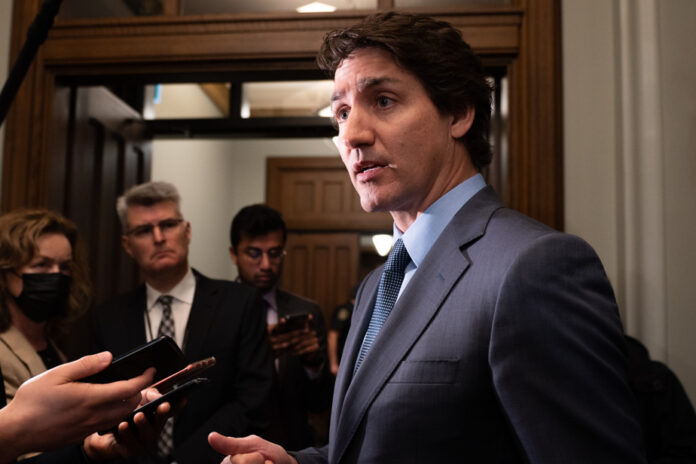(OTTAWA) Canadians may lose patience if the labor dispute between 155,000 federal public servants and the government continues, Prime Minister Justin Trudeau warned Wednesday. He wouldn’t go further on the conditions that would justify a special back-to-work law, but four of his ministers have been clear: the walkout will cause a lot of upheaval, even if essential services will be maintained.
“This is the first day of a union disruption,” he said before the weekly Liberal caucus meeting. We have work to do at the bargaining table. We have proposals on the table. We should commit to that. We are not going to pre-empt the reflection. »
“We had an offer on the table Monday night which they didn’t respond to before going on strike,” he said.
Mr. Trudeau called on the Public Service Alliance of Canada (PSAC) and the Treasury Board to break the deadlock. Both parties indicated Tuesday evening that they remained at the negotiating table.
“It’s what Canadians expect and I know Canadians aren’t going to be very patient if this continues,” he said.
While saying she was optimistic that she could reach an agreement, the president of the Treasury Board, Mona Fortier, was firm.
“You can’t sign a blank check. Many PSAC demands are completely unworkable, and others would have serious repercussions on our ability to provide services to Canadians,” she said at a press conference in parliament.
“We must ensure that these agreements are reasonable for taxpayers and support our main objective, to serve Canadians. This is always our goal and I am convinced that we can reach an agreement, “said the one whose ministry oversees the public service.
The union is demanding a 13.5% wage increase over three years, while the government is offering 9% instead. Job security and the addition of telecommuting in the collective agreement are among the points in dispute.
The government assures that essential services will be maintained, but taxpayers who are waiting for a tax refund may have to be patient. Processing of tax returns is on hold, but the May 1 deadline for filing remains.
Contingency plans had been drawn up in anticipation of a walkout: Canada Child Benefit payments “will continue to be made as planned,” while others will be “prioritized,” the minister said. from the Minister of National Revenue, Diane Lebouthillier.
The delivery of passports, which had already caused a lot of headaches last spring, will be laborious.
In fact, “the majority of Canadians” will not be able to apply for or renew a passport, as issuing them is not considered an essential service under the law, except “in emergency or humanitarian circumstances”, said Employment and Social Development Minister Karina Gould.
She put the number of requests that would accumulate for each week of the interruption at 85,000.
Employment insurance benefits, the guaranteed income supplement, the war veterans allowance as well as the assignment of the social insurance number are, for their part, considered essential services, specified the minister responsible for Canada.
The disruption will also be felt “significantly” at the Department of Immigration, Refugees and Citizenship, Minister Sean Fraser has warned. “Our capacity will be significantly reduced and there will be processing delays across all of our immigration departments,” he said bluntly.
Telephone wait times will be “just as badly impacted”, and the labor dispute will also affect the progress that had been made within this department, which also experienced its share of difficulties during and after the pandemic,” said Minister Fraser.
NDP Leader Jagmeet Singh and members of his caucus swelled the ranks of the picket line outside Center Block on Wednesday morning. “I am deeply disappointed that the government failed to reach an agreement”, declared the day before the leader, fiercely opposed to a special law.
In the Conservative camp, Pierre Paul-Hus attributed the blame to the Prime Minister for this strike. “Seeing the public service on strike clearly demonstrates that Justin Trudeau was unable to have negotiations in good faith,” he charged in a scrum after the caucus meeting.
He would not say whether his training would support a possible law forcing public servants back to work.
Bloc Québécois MP Alain Therrien, meanwhile, quickly closed the door: “The Bloc Québécois has never voted for a special law, I say that up front. We agree with the principle that we must negotiate, that people be in good faith, and that workers have an advantage in negotiating to return to work ”.
“I’m pretty sure that the people who are on strike right now don’t want to do this as a career,” he said at a press briefing.


















